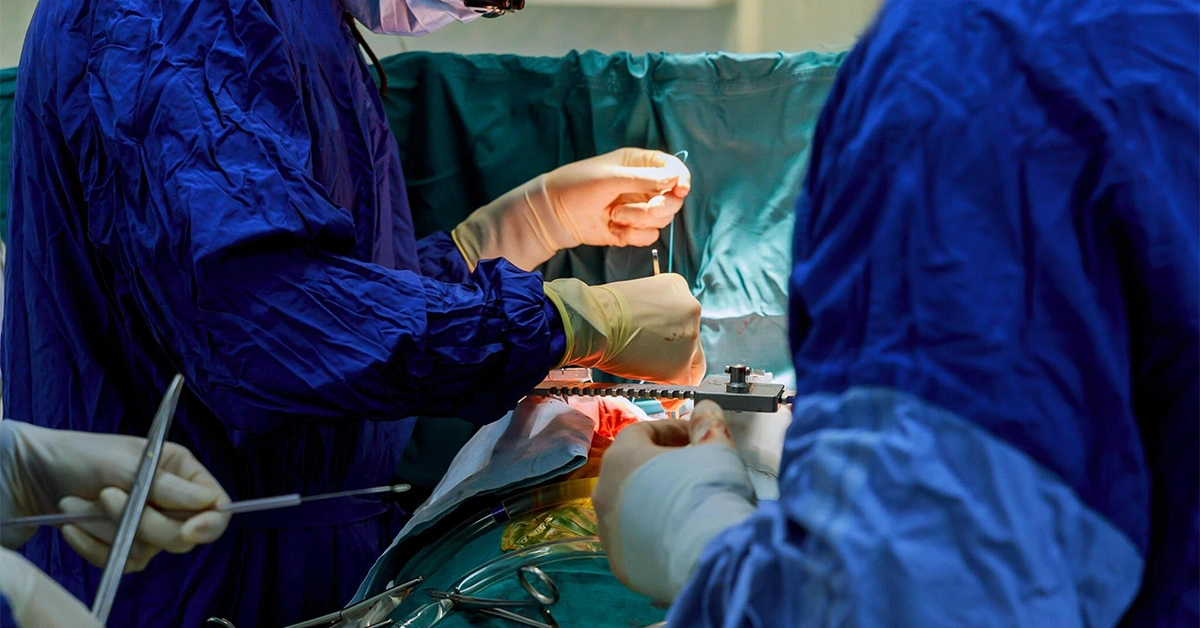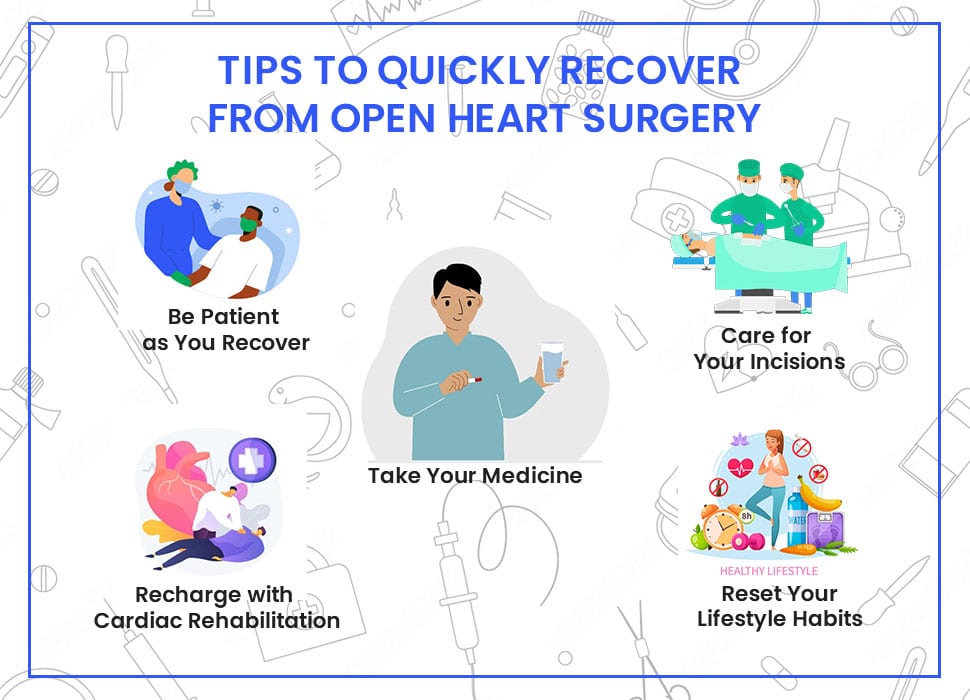Table of Contents
Open heart surgery is a complex medical procedure that involves surgical intervention within the chest to address various heart conditions. Typically performed under general anesthesia, this intricate surgery requires the chest cavity to be opened, allowing surgeons direct access to the heart. There are two main types of open-heart surgery: on-pump, where a heart-lung machine temporarily takes over the heart’s function, and off-pump, where the heart continues to beat during the procedure. This critical intervention is to treat a range of cardiac issues, including coronary artery disease, heart valve disorders, and congenital heart defects, aiming to restore optimal heart function and improve overall cardiovascular health. Let us keep reading to know more about open heart surgery recovery.
On-Pump Surgery
In On-Pump surgery, the heart-lung machine, also known as a cardiopulmonary bypass, temporarily takes over the functions of the heart and lungs. This machine allows the surgeon to stop the heart, providing a bloodless and motionless environment for precise surgical intervention. On-Pump surgery is often for complex procedures, such as coronary artery bypass grafting (CABG) or valve replacements, where a bloodless field is crucial for intricate repairs.
Off-Pump Surgery
Off-Pump surgery, also referred to as beating-heart surgery, involves operating on the heart while it continues to beat and pump blood. Unlike On-Pump surgery, the heart-lung machine is not utilized in Off-Pump procedures. Instead, specialized tools and techniques are employed to stabilize and isolate the area of the heart undergoing surgery. This approach is considered beneficial for certain patients, as it may reduce the risk of complications associated with the use of the heart-lung machine. Off-Pump surgery is often chosen for individuals with specific medical conditions or those at a higher risk for complications related to the cardiopulmonary bypass.
Recovery From Open Heart Surgery
Recovery from open heart surgery is a gradual process that demands careful attention and commitment. Here are essential steps to facilitate a smooth and effective healing journey.
1. Be Patient as You Recover
Patience is paramount during the open heart surgery recovery period. Allow your body the time it needs to heal. Understand that progress may be gradual, and pushing yourself too hard can impede the recovery process. Listen to your body’s signals and respect its need for rest and recuperation.
2. Care for Your Incisions
Proper care of surgical incisions is crucial to prevent infections and promote optimal healing. Follow your healthcare provider’s instructions for cleaning and dressing your incisions. Report any signs of infection, such as redness, swelling, or unusual discharge, promptly to ensure prompt medical attention.
3. Recharge with Cardiac Rehabilitation
Engaging in a structured cardiac rehabilitation program is a vital component of recovery. These programs typically involve a combination of monitored exercises, educational sessions, and emotional support. Participating in cardiac rehabilitation helps rebuild strength, improve cardiovascular health, and enhances overall well-being.
4. Reset Your Lifestyle Habits
Post-surgery presents an opportune time to reassess and reset lifestyle habits. Adopting a heart-healthy diet, quitting smoking, managing stress, and incorporating regular physical activity are pivotal for long-term cardiovascular health. Consult with your healthcare provider to tailor lifestyle adjustments to your specific needs.
5. Take Your Medicine
Adherence to prescribed medications is fundamental for a successful recovery. Medications may include pain management drugs, antibiotics to prevent infections, and drugs to regulate blood pressure or address specific heart conditions. Consistency in taking medications as prescribed is essential to manage symptoms and support overall cardiac health.
By diligently following these recovery steps, you empower yourself to navigate the post-open-heart surgery period with resilience and promote a healthier, more vibrant future. Remember, your healthcare team is there to guide you through each step of the process, ensuring a comprehensive and personalized approach to your recovery
Time to Recover From Open Heart Surgery
The open heart surgery recovery time varies from person to person, but on average, it takes about six to eight weeks for physical recovery. However, individual experiences may differ based on factors such as the type of surgery, overall health, and adherence to post-operative guidelines. It is essential to be patient, follow your healthcare provider’s recommendations, and gradually resume normal activities as advised.
How Will My Heart Condition Be Monitored After Surgery?
Monitoring your heart condition post-surgery is crucial for a comprehensive recovery. Here are key steps:
-
Check Your Pulse Every Day: Regularly checking your pulse provides insights into your heart’s rhythm. In case of any irregularities let your healthcare provider know immediately.
-
Weigh Yourself Every Day: Daily weight monitoring is essential, as sudden changes may indicate fluid retention, a potential post-surgery concern that requires attention.
-
Take Your Medications as Prescribed: Adhering to prescribed medications is vital for managing pain, preventing infections, and regulating your heart’s functions. Consistent medication adherence is crucial for a successful recovery.
-
Keep Your Follow-Up Appointments: Scheduled follow-up appointments allow your healthcare team to monitor your recovery progress, address any concerns, and make necessary adjustments to your treatment plan. Attend all appointments, even if you feel well, to ensure a thorough evaluation.
How Will We Take Care of Myself at Home?
Adapting to life at home post-surgery requires careful consideration and self-care. Here are some guidelines:
-
Ease Back into Daily Routine: Start with light activities and gradually increase intensity as advised by your healthcare provider. Prioritize rest, and listen to your body’s signals. Communicate openly about any concerns or challenges you may face in your daily routine.
-
Follow a Heart-Healthy Lifestyle: Continue the positive lifestyle changes initiated during recovery. Adopt a heart-healthy diet, engage in regular physical activity within your prescribed limits, quit smoking if applicable, and manage stress through relaxation techniques.
-
Stay Connected with Your Healthcare Team: Maintain open communication with your healthcare team. Report any unexpected symptoms, concerns, or changes in your overall well-being promptly. Regular communication ensures a collaborative approach to your ongoing care.
Conclusion
Hence By incorporating these measures into your daily routine and staying attuned to your body’s needs, you contribute significantly to a successful and sustained recovery from open-heart surgery. Always consult with your healthcare provider for personalized advice and guidance tailored to your specific situation. Did you Know about Johnny Rzeznik Plastic Surgery



